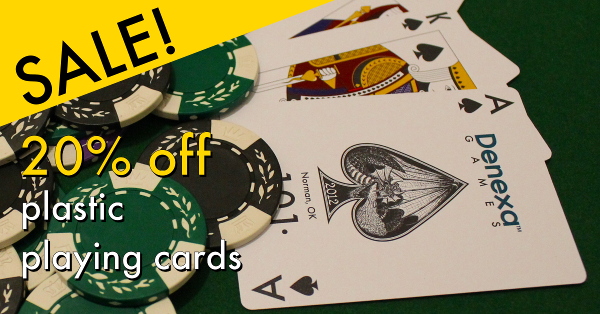House rules for card games
One of the most beautiful things about the standard 52-card deck of cards is its flexibility. Not the physical flexibility the cards have when you bend them—though it comes in handy when you try to shuffle, of course! Rather, what makes playing cards so great is their flexibility to be used for many different sets of rules. We tend to think of card games as discrete entities, saying we’re playing “Whist” or “Poker” or “Cash” or “Canasta“. In reality, these are just names given to a certain set of rules dictating the course of game play. When you look closer, however, you discover each of these labels covers a fair bit of ground, and there are a few different versions of each game in circulation.
Unfortunately, card games’ flexibility can also be their downfall. A lack of clarity regarding the rules can cause chaos at game night. Disagreement over rules and accusations of cheating can cause hard feelings between old friends. If not handled properly, this can break up a long-standing game group!
Fortunately, avoiding such a scene is easy with a little forethought. All you need to do is establish a set of house rules to make sure everyone is on the same page when it comes to the game.
Why are card game rules so tricky to get right?
When a new board game is created, an inventor or team of designers usually sits down and creates a brand new game from scratch. Often, this is done under the supervision of a company planning to sell it. While some traditional card games are created this way, like Contract Bridge or Triple Play, most evolve incrementally over time. A player learns the game somehow, then introduces it to their group of friends. Over time, they might make a few changes to the rules to suit their tastes. Then, someone from that group teaches their version of the game to another group, and the process repeats.
Over time, this creates a few different versions of the game under the same name. After the changed version of the game has drifted far enough away from the original game, it might receive a new name to distinguish it from the original.
Of course, this drifting will, over time, result in the library of card games expanding and giving players new games and new variations in the rules to try out. As it’s going on, though, we’re left with a problem. What people call “Whist” might be played under different rules in Chicago than it is in Charlotte. While this wouldn’t matter if everyone always played with the same group of people, inevitably someone who learned the game one way is going to play with someone who learned another. That sets the stage for conflict.
Choosing your house rules
A few games, like Contract Bridge, have governing bodies enforcing a single set of rules for professionally-organized play. Casinos also have a specific set of rules they train their dealers to follow, backed up by surveillance officers who ensure the dealers are following them to the letter. But the vast majority of games aren’t played in an organized fashion; they’re played in homes, between friends and family members. As the host, you are the one who is responsible for choosing the rules that govern. These rules are your house rules.
The easiest course of action is to bless an existing set of rules as the official rules for your game group. The game rules on our website are a good place to start. The descriptions on this site are designed, as much as possible, to provide a straightforward and easy-to-teach rules set. That makes them a good base for your house rules. There are, of course, hundreds of card game books with other, possibly more complex, rules sets you can choose from. After all, that’s where the phrase “according to Hoyle” came from.
Don’t be afraid to include your players in the discussion. Getting input from everyone goes over a lot better than “my house, my rules”. You may find some players prefer a different set of rules you hadn’t considered.
Using your house rules
Once you have chosen a set of rules, it’s time to play. Before you deal the first hand, make sure everyone knows which set of rules are your official house rules. (Be sure to inform new players of this when they join the group, as well. You may need to give them time to familiarize themselves with the rules.)
It’s crucial the rules are on hand all throughout game play. If the rules are in a book, have the book in the room. If they’re online, give everyone a link to the page they’re on. A printed copy of the webpage might be nice to have on hand as well. Some people read faster on paper than on a screen, and it’s nice to have a copy if the wifi (or the website!) goes down.
Any time there is a question as to the rules, stop and consult the rules you have made official. Not only will this prevent arguments about what the rules are, it will mean the rules stay consistent from game to game.
Customizing and updating your house rules
The great thing about card games is there is no wrong way to play them! The only thing that matters is everyone having fun. If you want to change up your game, all you have to do is update your official house rules.
As you become more comfortable with a game, you may seek out more information about it and come across a variation you want to try out. You may even come up with an idea for something you want to add, and write a new rule yourself.
Another reason you might want to edit your house rules is because the way they’re written is ambiguous. If the rules don’t make it clear how a particular situation should be handled, let the group come to a conclusion about the fairest way to resolve the situation. Then, document the group’s decision in your house rules. Next time it arises, you’ll know what to do, and the rules will be consistent with what you did last time.
Whenever you update the rules, again, be sure to get the group’s buy-in. Make sure everyone is aware of the changes, especially members of the group who may not have been there when it was discussed. Keeping everyone informed will keep your players happy and your game fair.


